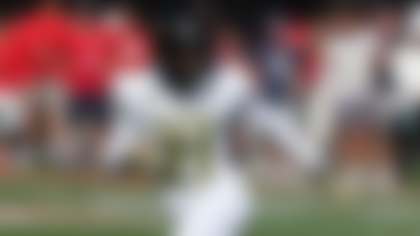NFL Competition Committee Chairman Rich McKay told reporters Tuesday that it's too early in the season to make a declaration on the effectiveness on replay review of offensive and defensive pass interference.
"I don't think that we would give a summation on whether rule that's been in place for six weeks is working or not working," he said. "Let's let the season play out, just like in use of helmet last year, it was a new rule, we waited until the end of the year. We went back and examined all of it."
McKay continued: "It's a brand new rule, one that our coaches are getting accustomed to, one that our players and fans are getting accustomed to and one that the officials are getting accustomed to. So I don't think for us we did it that way; we gave them the numbers, we showed them plays. But I think we're gonna reserve or at least I always have thought it's way better to reserve judgment 'til the season is over. You've seen the full season and you've got an opportunity to look at all the tape, which is traditionally what we do."
The NFL's one-year experiment with PI replay on pass interference calls has not been without controversy through the first six weeks of the season.
Coaches across the league have expressed their frustration on a seemingly unclear interpretation of what constitutes "clear and obvious" hindrance, which has led to a trend of failed challenges and wasted timeouts on potential game-altering plays.
There has been a total of 44 pass interference reviews so far with only seven reversals of the call on the field. Six of the reviews have come from New York, so the number reduces to 38 coaches challenges this season with only four reversals, per NFL Research. ESPN's Kevin Seifert also noted prior to Monday's Lions-Packers game that coaches have been unsuccessful on 24 of their past 25 challenges.
"It's a brand new rule, one that our coaches are getting accustomed to, one that our players and fans are getting accustomed to and one that the officials are getting accustomed to," McKay said. "So I don't think for us we did it that way; we gave them the numbers, we showed them plays. But I think we're gonna reserve or at least I always have thought it's way better to reserve judgment 'til the season is over. You've seen the full season and you've got an opportunity to look at all the tape, which is traditionally what we do."
Pass interference review was put into place this offseason to prevent any scenarios like what transpired during last season's NFC Championship Game when a clear call against Rams cornerback Nikell Robey-Coleman was missed. McKay reiterated the rule is intended to prevent the egregious calls.
"When the rule was put in place, the emphasis probably in the room, back to the days of the vote, was we want to get the egregious ones and we want to get them overturned," he said. "The way the rule was written was using our natural replay language which says it's gotta be an obvious error and it's gotta be one that, in PI's case it results in substantial hindrance. So I'm not going to get into how it's currently being done from New York, because I think that's something that we're all better off doing, at least for us as a committee, we're always better off doing it at the end of the year.
"But we did know one thing going in, that this is the first time we've lived in a subjective world where we're gonna have a subjective review by an individual as opposed to objective. And we knew that would lead to disagreement. Didn't mean we shouldn't do it, but it did mean that we knew there was gonna be disagreement. One thing about replay that served us well is when it's in an objective world, whether the two feet are in, whether the ball crossed the plane, even then we can begin to argue at times, but there is objective standards. When you get into the subjective world, we knew that would mean it would be open for discussion."











